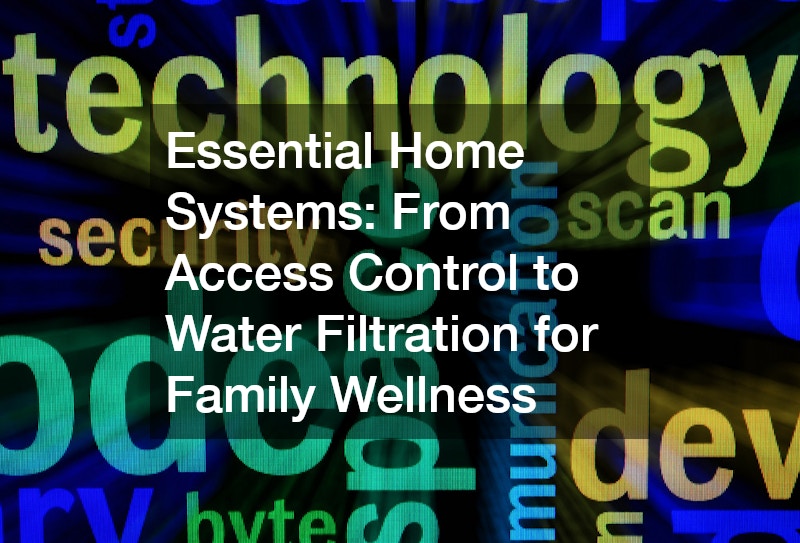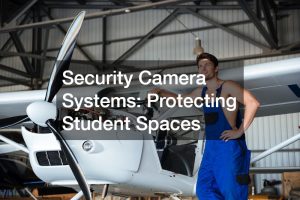As a student, your living environment plays a crucial role in your academic performance and personal well-being. From security to comfort and efficiency, modern home systems such as access control, water filtration, and space management are becoming essential components of day-to-day life. As education becomes more rigorous and the demands of student life continue to evolve, creating a safe and comfortable living space is key to optimizing performance. This guide will delve into a variety of systems designed to improve home security, health, and overall productivity. Whether you’re in a dorm, shared housing, or your own apartment, these systems can help create an optimal study environment while preparing you for future challenges. Let’s explore the key home systems relevant to students today.
Access Control Systems for Student Housing
Security is a top concern for students, especially in dorms or shared housing. Access control systems are a highly effective way to manage and monitor who enters and exits buildings, ensuring that only authorized individuals can gain access to specific areas. In tandem with security camera systems, they enhance campus security and prevent theft or unauthorized entry.
These systems provide peace of mind and reduce unauthorized intrusions. Access control can also integrate with other technology such as GPS theft prevention , ensuring that personal belongings like laptops and bikes remain secure.
What is an Access Control System?
An access control system is a technology designed to limit entry to authorized personnel using keycards, biometric scanners, or mobile access systems. These systems are commonly implemented in student dormitories, university buildings, and even student apartments to provide peace of mind and prevent unauthorized access. In a world where safety concerns are growing, these systems have become increasingly popular on college campuses across the country.
How It Benefits Students:
Access control systems benefit students in many ways. They help reduce the risk of unauthorized intrusions, theft, and other security breaches. In dormitories or shared living spaces, students often worry about who has access to their building or living quarters. With a well-functioning access control system, students can feel secure knowing that access is restricted to residents and authorized visitors. Moreover, when paired with security camera systems, this security measure becomes even more effective, ensuring that any suspicious activity is recorded and monitored.
Statistic: According to a study by the National Center for Education Statistics, campuses with robust access control systems saw a 30% reduction in unauthorized entry incidents, which resulted in improved safety and a more secure environment for students. This is especially significant as students focus on their studies without worrying about their personal safety.
Autoclave Sterilizers in Student Labs
For students pursuing careers in medical, dental, or biological sciences, familiarity with autoclave sterilizers is crucial. These machines are vital for ensuring that laboratory equipment remains clean, sterile, and free from contamination. Whether you’re working on experiments in a school lab or participating in hands-on medical or dental training, understanding how autoclaves function is key to maintaining a safe working environment.
What is an Autoclave Sterilizer?
An autoclave sterilizer uses high-pressure steam to eliminate harmful bacteria, viruses, and other pathogens from laboratory instruments. These devices are essential in a variety of fields, from biology labs to hospitals, and are a critical part of ensuring hygiene and safety. For students in medical or scientific fields, learning to operate an autoclave is often a necessary skill that prepares them for future roles in healthcare or research.
Why Students Need to Know About It:
Understanding how to use an autoclave sterilizer is essential for any student involved in lab work. Not only does it prevent contamination, but it also ensures that all equipment remains safe for future use. For students, particularly those studying medical or dental fields, this knowledge is a vital part of their education. For example, students working in microbiology labs need sterile equipment to ensure the accuracy of their experiments. In clinical settings, autoclaves are used to sterilize surgical tools, dental instruments, and other equipment, reducing the risk of infections and ensuring patient safety.
Moreover, exposure to autoclave technology prepares students for the real world by introducing them to industry-standard sterilization practices. As healthcare continues to advance, autoclaves will remain integral to medical facilities, making this knowledge incredibly valuable for future healthcare professionals.
CDL Class A Courses: A Path to Opportunities
For students looking to enter the workforce quickly and gain valuable skills, CDL Class A courses offer a unique opportunity. These courses teach students how to operate large commercial vehicles, such as trucks and trailers, which are critical to industries such as logistics, transportation, and construction. Whether you want to take a break from academia or supplement your studies with practical skills, CDL training provides an excellent pathway into well-paying careers.
What are CDL Class A Courses?
CDL (Commercial Driver’s License) Class A courses are designed to teach individuals how to drive large vehicles that weigh more than 26,001 pounds. These vehicles typically include tractor-trailers, tanker vehicles, and flatbeds. The courses cover a range of topics, from road safety and traffic laws to vehicle maintenance and cargo management. CDL Class A training equips students with the skills needed to obtain a license and work as a professional truck driver.
The skills gained from CDL training can open doors to numerous opportunities, especially in sectors like automotive shop management system where the knowledge of large vehicles is essential. Such training can lead to a stable career path that provides financial security while allowing students to enter the workforce quickly.
Benefits for Students:
For students who are undecided about their future career path or who want to gain valuable, in-demand skills, CDL Class A courses can be an excellent option. The transportation industry is currently facing a shortage of licensed drivers, creating an abundance of job opportunities for qualified candidates. Furthermore, many companies offer competitive salaries, benefits, and job security to CDL holders. This career path is particularly appealing to students who prefer hands-on work and who want to start earning a living quickly. In some cases, students may even combine their studies with part-time or seasonal trucking jobs, providing a flexible source of income.
Example: According to the Bureau of Labor Statistics, the demand for truck drivers is expected to grow by 6% over the next decade, providing stable job prospects for individuals with a CDL Class A license. Many trucking companies also offer paid training programs for students, further reducing the barriers to entry.
Surrogate Baby: Understanding Ethics and Science
For students studying health sciences, ethics, or social work, the concept of surrogacy is increasingly relevant. Understanding the implications of what surrogate baby means and how it impacts society is an important topic that touches on issues of medical ethics, reproductive rights, and the role of technology in modern healthcare.
A surrogate baby is a child born through an arrangement in which a woman (the surrogate) agrees to carry and give birth to a baby on behalf of another person or couple. Surrogacy can be used by individuals or couples who are unable to conceive naturally due to infertility, health conditions, or other challenges. It involves complex medical procedures, such as in vitro fertilization (IVF), and raises important ethical questions about the rights of the surrogate mother, the intended parents, and the child.
Relevance for Students:
For students studying medicine, law, or social sciences, understanding surrogacy is vital. Medical students, for example, need to grasp the biological and technological aspects of fertility treatments, while law students may focus on the legal contracts and ethical issues involved in surrogacy arrangements. Similarly, social work students may explore the social and psychological impacts on all parties involved. Surrogacy also raises questions about access to reproductive technology and the rights of LGBTQ+ individuals and couples who often rely on surrogacy to start families.
This topic is gaining attention as more countries around the world are developing laws and regulations regarding surrogacy, making it an important subject of study for students interested in modern healthcare and ethics.
Polyethylene Film: Enhancing Energy Efficiency
For students living in dorms or rented apartments, reducing energy costs is often a high priority. One effective and affordable way to do this is by using polyethylene film to insulate windows and other parts of your living space.
What is Polyethylene Film?
Polyethylene film is a type of plastic sheeting that is commonly used for insulation in buildings. It is especially effective for sealing windows, reducing drafts, and minimizing heat loss during colder months. This simple and inexpensive material can be a lifesaver for students on a budget who are trying to cut down on energy bills.
How Students Can Benefit:
Installing polyethylene film on windows can significantly lower heating costs during the winter. For students, this means fewer expenses on utility bills and a more comfortable living environment, which can improve focus and productivity during study sessions. In the long term, learning about energy-efficient practices like using polyethylene film can also foster a greater awareness of sustainability and environmental conservation. It’s a great practical skill that students can carry into adulthood, especially as energy costs continue to rise across the globe.
Statistic: Research shows that homes using polyethylene film for window insulation experience up to a 15% reduction in heating and cooling costs, making it an excellent choice for budget-conscious students.
Gas Blending Systems: An Introduction for Engineering Students
For students pursuing degrees in engineering or chemistry, gas blending systems are a key component of many industrial and laboratory applications. Understanding how gases are blended and utilized in various settings is essential knowledge for students entering these fields.
What are Gas Blending Systems?
Gas blending system mix two or more gases in precise ratios for use in a variety of applications, including welding, chemical experiments, and medical treatments. These systems require precise calibration and monitoring to ensure that the correct gas mixture is produced, making them an important tool in both industrial and scientific environments.
Why It’s Relevant for Students:
For students studying engineering, chemistry, or related fields, gas blending systems provide a valuable learning opportunity. Not only do these systems help students understand the properties of different gases, but they also introduce important concepts related to safety, precision, and industrial applications. In many cases, students may have the opportunity to work with gas blending systems in laboratory settings or during internships, giving them hands-on experience that is crucial for future employment.
Moreover, the use of gas blending systems in the medical field, particularly in respiratory treatments and anesthesia, has made it an essential skill for medical and bioengineering students to learn.
Colocation: Optimizing Data Storage for Students
In the age of digital learning, colocation services can help students better understand how data centers function. Colocation refers to the practice of housing privately-owned servers and networking equipment in a third-party data center. For students studying computer science or IT, learning about colocation provides valuable insight into managing and securing data storage.
Data center operations and colocation play significant roles in the modern business and technology landscape, making them essential subjects for students interested in cloud computing, server management, and IT infrastructure.
Whole Home Water Filtration Systems: Ensuring Clean Water
Whole home water filtration system are designed to filter out contaminants from the water supply. For students living in areas where water quality may be an issue, having access to clean, filtered water is crucial for their health and well-being.
Students studying environmental science or public health may explore how water filtration systems work to remove harmful chemicals and impurities, improving the overall quality of drinking water. Learning about these systems equips students with knowledge about maintaining good health and sustainable living practices
Space Management Systems: Optimizing Student Living and Learning Spaces
Space management systems are tools used to optimize the use of physical spaces within an organization. For students, understanding how space management works can help them efficiently organize their dorms or shared living spaces, ensuring that they have an environment conducive to study and relaxation.
In academic institutions, space management systems are used to allocate classrooms, labs, and study areas in a way that maximizes student productivity. Learning how to apply these principles helps students manage not only their living spaces but also their time and resources effectively.
Outdoor Energy Storage Systems: Powering Sustainable Campuses
With an increasing focus on sustainability, campuses around the world are turning to outdoor energy storage system to support renewable energy initiatives. These systems store energy generated from sources like solar panels and wind turbines, making them a valuable tool for schools aiming to reduce their carbon footprint.
For students studying environmental science, engineering, or renewable energy, learning about outdoor energy storage systems is essential. These systems represent the future of sustainable energy, helping campuses become greener while reducing reliance on traditional energy sources.
Structured Cabling: Enhancing Connectivity in Study Environments
Structured cabling refers to the infrastructure that supports an organization’s telecommunications system. For students living in shared housing or dorms, understanding how structured cabling works can help them troubleshoot issues related to network connectivity, which is critical for online classes, research, and communication.
Students pursuing IT or engineering degrees will encounter structured cabling in their studies, as it forms the backbone of communication networks in both academic institutions and businesses.
Security Camera Systems: Protecting Student Spaces
With a heightened awareness of security on college campuses, security camera system have become increasingly common in dorms, student apartments, and classrooms. These systems help deter theft and unauthorized entry, providing an added layer of safety for students.
Students studying criminal justice, security, or law enforcement might also explore the legal and ethical implications of surveillance in public and private spaces, making security camera systems a multifaceted topic for academic exploration.
Whether you’re focusing on security with access control systems, preparing for medical or dental careers with autoclave sterilizers, or exploring modern energy efficiency with polyethylene film, students today have a wealth of home systems to help enhance their education and living environments. These tools not only provide immediate benefits but also equip students with practical knowledge and skills that they will carry into their future careers. From lab work to driving commercial vehicles, understanding these essential systems will prepare you for the diverse challenges and opportunities of the modern world.




